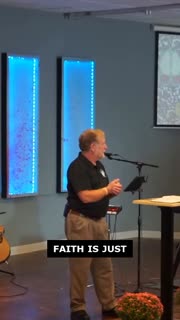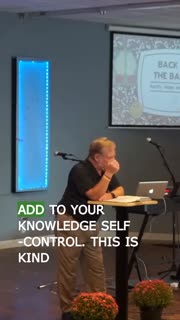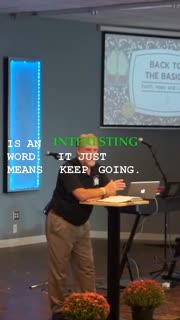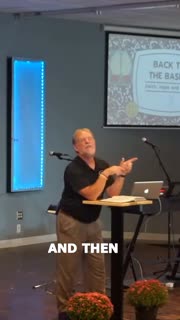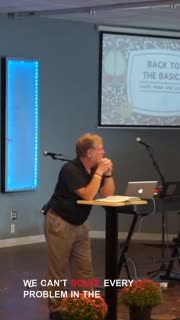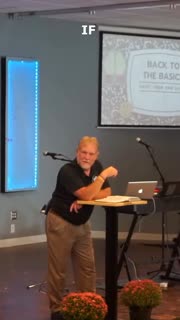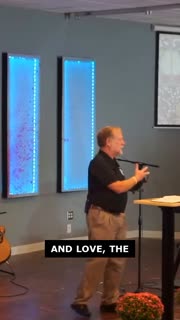Building Faith: Assembling Christian Virtues Together
Devotional
Sermon Summary
Bible Study Guide
Sermon Clips
1) "Josh started out this year, since September, doing a short series that is on the three kind of essential aspects of what it means to be a Christian. The Christian walk, the Christian identity, all that stuff. Faith, hope, and love. And his key verse that he built those three ideas from, like seeds that sprouted, was 1 Corinthians 13, chapter 13. In 1 Corinthians 13, Paul is explaining a word in the first century to the church they didn't really use a lot. The concept of love now, we kind of think of it as romance, or flowers, or chocolate. But in the first century, they didn't really use a lot. They didn't really use a lot. Or getting married, or loving hot dogs, or whatever it is. We use the word a lot. But in the first century, there were different words that had to do with human relationships, and the word Paul used in 1 Corinthians 13 is not one of the common words." [01:54] (67 seconds)
2) "Grace and peace be yours. Those are two really commodities in short supply. They were in the first century, and they still are today. We don't see a lot of grace out there, and there's certainly not a lot of peace in the world. So Peter starts out by saying, hey, let's lay a foundation here. There's some stuff you don't have. Let's get grace and peace up on the table. Grace and peace be yours in abundance through the knowledge of God and of our Lord Jesus Christ. His divine power has given us everything we need for a godly life. When I read that in my study this week, I thought, okay, there's the Ikea package. It just got delivered." [05:17] (50 seconds)
3) "For this very reason, make every effort to add to your faith goodness. And one thing's really important to understand. The Bible never starts out to prove that God exists. Never. You read all the way through from Genesis 1 to Revelation 22, you're not going to find God proving himself. I love math. I love algebra. I love trigonometry. I love that stuff. I love calculus. And in solving math problems, you get this really complex equation, and the equation is true and it works, but you have to be given some piece of information to figure it out. That's called a given. You have to be given that. Whoever it is that's trying to solve a problem says, X equals, here's the number. If you don't know that, you're never going to be able to use the formulas. It just is never going to work. So the Bible starts out with a given." [08:52] (71 seconds)
4) "Faith is just your belief system. So you either believe that God is, or you don't believe that God is. You believe the chair is going to hold you up, or you don't believe that. If you don't believe that, what are you sitting there for? If you really don't believe the chair is going to hold you up, you would not sit in that chair. If you believed that black ice is on a corner, you're going to drive that corner more carefully than if you believe there's no black ice there. You believe something. So scripture says, scoop your faith from all the various options that are out there and just believe in God, because you already have enough faith. So add to your faith." [10:34] (41 seconds)
5) "Add to your knowledge self-control. This is kind of an interesting one. I have a whole passel of grandchildren. They were just sneaking back and forth through there. So I don't know what they're doing today in the kids area, but they're sneaking back and forth. You can't see that. I can see that. But the idea of self-control is taking one thing that you know and doing it now. You can't do everything, but you can do something. So add to your knowledge what you know to be. Add self-control. And self-control is an interesting word in Greek. It's edkrateia, and it means out of yourself there's a strength." [12:03] (47 seconds)
6) "Perseverance is an interesting word. It just means keep going. Keep at it. Perseverance doesn't mean you are going to run a marathon the first time you get out and run. It means just keep one step going in front of another and keep at that for a while. To perseverance, add godliness. And this is the first mention he's had of any kind of godliness. He's had a lot of godliness. He's had a lot of spirituality at all. Everything up until now is just common life, just how you do it. Godliness is that comes like the fifth or sixth item that Peter mentions in this list that has to do with capturing something divine that comes out of your faith and your goodness." [13:47] (47 seconds)
7) "And then add to your Philadelphia, agape, love. And what Jesus said and taught about agape, he used whatever Aramaic word. He didn't speak Greek. He spoke Aramaic. So whatever word that he used in that context, the early disciples said, everyone else in the world that we're reaching speaks Greek. So we've got to find a word that communicates to Greek-speaking people what Jesus meant when he used chesed, or whatever word in Aramaic he used. Agape is the word that was chosen by the early church to communicate what Jesus meant. But it wasn't romance. It wasn't affection. It wasn't desire. It wasn't liking somebody or falling in love. It wasn't that." [17:02] (58 seconds)
8) "We can't solve every problem in the world, but we can do something. And it took a lot of steps, one by one by one, to take a starting point and add to it. That's ultimately all the Christian life is. That's how you do faith, hope, and love. You can't get it all. You don't get it all. I understand. Understand. Peter understood that. Jesus understood that. And what's interesting is sometimes you walk around the Ikea building of Christianity and you see saints that are porcelain. People have gold on them and beautiful robes and all the fancy stuff. You say, I could never get there. I can't do that. I can't be that good. I can't be that. I don't know that much of the Bible. I can't figure all that stuff out. I'm such a loser. I'm such a, at the bottom, I can't get it. Faith, hope, and love, it's just hopeless." [30:00] (48 seconds)
9) "If you possess these qualities in increasing measure, they will keep you from being ineffective and unproductive in your knowledge of our Lord Jesus Christ. Peter says right there, you don't have it all finished and that's okay. It's not if you have these qualities perfect and you're the Ikea display case. No. If you're building it as you go along, if you're figuring it out step by step, if you're adding a little bit each day, each experience, each trial, each success, if they're increasing in you, that's what will keep you from being unproductive. But whoever does not have them is nearsighted and blind, forgetting that they have been cleansed from past sins." [31:21] (55 seconds)
10) "Faith, hope, and love, the essentials of Christian life. How do you do it? You just start. If we were all to stand up and kind of aim southeast, we all turn and face southeast. And I say, we're going to go to New York City. How are we going to do that? You take one step and you're on your way. That's all it takes. And that's what Peter's talking about in terms of understanding what it really means to be a Christian. Not that you're flawless, not that you're perfect. Somebody could examine every moment of your life and find a flaw, find something you did wrong, some word you said. Wasn't the right word to say, some scowl. Your feet are going to stink. Okay, people are going to find that out. But Peter says, start where you're starting, add to it, and then add to that, and then add to that. And the process is okay. That's what God is looking for, not flawless perfection that you've got it all answered." [34:33] (69 seconds)
Ask a question about this sermon
2) "Grace and peace be yours. Those are two really commodities in short supply. They were in the first century, and they still are today. We don't see a lot of grace out there, and there's certainly not a lot of peace in the world. So Peter starts out by saying, hey, let's lay a foundation here. There's some stuff you don't have. Let's get grace and peace up on the table. Grace and peace be yours in abundance through the knowledge of God and of our Lord Jesus Christ. His divine power has given us everything we need for a godly life. When I read that in my study this week, I thought, okay, there's the Ikea package. It just got delivered." [05:17] (50 seconds)
3) "For this very reason, make every effort to add to your faith goodness. And one thing's really important to understand. The Bible never starts out to prove that God exists. Never. You read all the way through from Genesis 1 to Revelation 22, you're not going to find God proving himself. I love math. I love algebra. I love trigonometry. I love that stuff. I love calculus. And in solving math problems, you get this really complex equation, and the equation is true and it works, but you have to be given some piece of information to figure it out. That's called a given. You have to be given that. Whoever it is that's trying to solve a problem says, X equals, here's the number. If you don't know that, you're never going to be able to use the formulas. It just is never going to work. So the Bible starts out with a given." [08:52] (71 seconds)
4) "Faith is just your belief system. So you either believe that God is, or you don't believe that God is. You believe the chair is going to hold you up, or you don't believe that. If you don't believe that, what are you sitting there for? If you really don't believe the chair is going to hold you up, you would not sit in that chair. If you believed that black ice is on a corner, you're going to drive that corner more carefully than if you believe there's no black ice there. You believe something. So scripture says, scoop your faith from all the various options that are out there and just believe in God, because you already have enough faith. So add to your faith." [10:34] (41 seconds)
5) "Add to your knowledge self-control. This is kind of an interesting one. I have a whole passel of grandchildren. They were just sneaking back and forth through there. So I don't know what they're doing today in the kids area, but they're sneaking back and forth. You can't see that. I can see that. But the idea of self-control is taking one thing that you know and doing it now. You can't do everything, but you can do something. So add to your knowledge what you know to be. Add self-control. And self-control is an interesting word in Greek. It's edkrateia, and it means out of yourself there's a strength." [12:03] (47 seconds)
6) "Perseverance is an interesting word. It just means keep going. Keep at it. Perseverance doesn't mean you are going to run a marathon the first time you get out and run. It means just keep one step going in front of another and keep at that for a while. To perseverance, add godliness. And this is the first mention he's had of any kind of godliness. He's had a lot of godliness. He's had a lot of spirituality at all. Everything up until now is just common life, just how you do it. Godliness is that comes like the fifth or sixth item that Peter mentions in this list that has to do with capturing something divine that comes out of your faith and your goodness." [13:47] (47 seconds)
7) "And then add to your Philadelphia, agape, love. And what Jesus said and taught about agape, he used whatever Aramaic word. He didn't speak Greek. He spoke Aramaic. So whatever word that he used in that context, the early disciples said, everyone else in the world that we're reaching speaks Greek. So we've got to find a word that communicates to Greek-speaking people what Jesus meant when he used chesed, or whatever word in Aramaic he used. Agape is the word that was chosen by the early church to communicate what Jesus meant. But it wasn't romance. It wasn't affection. It wasn't desire. It wasn't liking somebody or falling in love. It wasn't that." [17:02] (58 seconds)
8) "We can't solve every problem in the world, but we can do something. And it took a lot of steps, one by one by one, to take a starting point and add to it. That's ultimately all the Christian life is. That's how you do faith, hope, and love. You can't get it all. You don't get it all. I understand. Understand. Peter understood that. Jesus understood that. And what's interesting is sometimes you walk around the Ikea building of Christianity and you see saints that are porcelain. People have gold on them and beautiful robes and all the fancy stuff. You say, I could never get there. I can't do that. I can't be that good. I can't be that. I don't know that much of the Bible. I can't figure all that stuff out. I'm such a loser. I'm such a, at the bottom, I can't get it. Faith, hope, and love, it's just hopeless." [30:00] (48 seconds)
9) "If you possess these qualities in increasing measure, they will keep you from being ineffective and unproductive in your knowledge of our Lord Jesus Christ. Peter says right there, you don't have it all finished and that's okay. It's not if you have these qualities perfect and you're the Ikea display case. No. If you're building it as you go along, if you're figuring it out step by step, if you're adding a little bit each day, each experience, each trial, each success, if they're increasing in you, that's what will keep you from being unproductive. But whoever does not have them is nearsighted and blind, forgetting that they have been cleansed from past sins." [31:21] (55 seconds)
10) "Faith, hope, and love, the essentials of Christian life. How do you do it? You just start. If we were all to stand up and kind of aim southeast, we all turn and face southeast. And I say, we're going to go to New York City. How are we going to do that? You take one step and you're on your way. That's all it takes. And that's what Peter's talking about in terms of understanding what it really means to be a Christian. Not that you're flawless, not that you're perfect. Somebody could examine every moment of your life and find a flaw, find something you did wrong, some word you said. Wasn't the right word to say, some scowl. Your feet are going to stink. Okay, people are going to find that out. But Peter says, start where you're starting, add to it, and then add to that, and then add to that. And the process is okay. That's what God is looking for, not flawless perfection that you've got it all answered." [34:33] (69 seconds)



